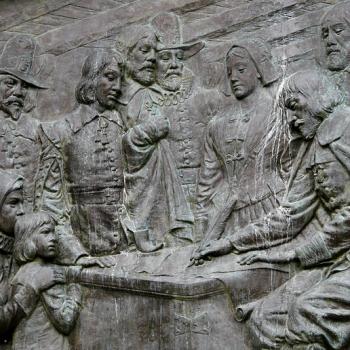I am working on a new book about the importance of historical thinking to the creation of a civil society, and I was recently sharing some thoughts from the book with a group of scholars and students. After telling the group that I thought people who study the past learn the skill of understanding people who are different from them, one of the historians at the table said that his work as a student of the past has made him a better husband.
I must admit that I was initially shocked by his statement, but very intrigued. This historian told us that he and his wife did not always see eye-to-eye on issues facing their family, their relationship, and society in general, but the skills he acquired through his work as a historian had helped him to relate to his wife in a more understanding way. When he became aware of the similarities between his vocation as a historian and his married life, he realized that he needed to show empathy before casting judgment. His marriage was better as a result.
I cannot tell you what the divorce rate is among historians, but the scholar's suggestion made more sense to me as I considered it further. As a historian, I urge my students to approach the past with a sense of empathy, understanding, and humility. I want them to "walk in the shoes" of people from the past. I want them to make sense of the world that people of the past inhabited before they condemn them for being weird or immoral. When I teach a document written by someone from the past, I demand that my students show the author of that document, even if he or she is dead, a certain degree of hospitality. These authors should be treated just like any present-day visitor that might enter the classroom.
What might it look like if we interacted with our spouses and loved ones in this way? What if we applied the lessons learned from studying the past to the person in the cubicle next to us at work? The result just might be a more civil and benevolent society defined by healthier relationships.
This approach to history is quite different from the one we learned in high school. It focuses less on a body of facts, dates, and movements and more on an engagement with the past, through the sources left behind, that cultivates virtues necessary to live in a civil society. Moreover, this approach to history does not require us to use the past to promote our agenda in the present, but forces us instead to resurrect the past—warts and all—and be transformed by the experience.
Several years ago, I took students through a series of texts written by nineteenth-century southern intellectuals who defended the institution of slavery. Just like everyone else in my class, Kevin was appalled at the arguments contained in these documents. But by entering into a conversation with their authors, and being opened to letting these writers change him, he became a better Christian.
Kevin learned that plantation owners often argued that slavery was justified because slaveholders treated their labor force (slaves) better than the burgeoning capitalists of the North treated their immigrant laboring class. Slaves were clothed, fed, Christianized, and usually worked ten hours a day. Northern industrial laborers, living in an age before the usual benefits afforded to workers today, worked sixteen hour days, were paid so poorly that they could not feed themselves or their families, and generally lived lives that were much worse than those of southern slaves. How dare the Northern abolitionists and capitalists claim the moral high ground! How dare they accuse slaveholders of immorality while all the while turning a blind eye to the plight of the working-class "slaves" in their midst! The South's anti-capitalist feudalism offered, as historians Elizabeth Fox-Genovese and Eugene Genovese have shown, one of the most powerful critiques of industrialization in nineteenth-century America.
Kevin was convinced that the slaveholders' criticism of northern industry did not take them off the moral hook. Slavery was still a reprehensible and sinful practice. Nor was Kevin sure that this defense of slavery was valid. The northern workers may have had it rough, perhaps even rougher than slaves, but at least they were free.
Kevin did, however, learn to be cautious about condemning others before hearing their side of the story. His response to these writers was not a knee-jerk moral criticism, but a thoughtful engagement with historical texts that taught him a valuable lesson about removing the log from your own eye before taking the speck out of the eye of another. Kevin listened to the slaveholders. He understood them. He empathized with them. He saw them as fellow human beings. He realized that some of their flaws were also present in his own life and his relationships with others. And in the process he was, in a small way, changed. Are not these the kinds of transformative encounters that we want people to have with the past? It seems likely that dozens and dozens of such encounters would produce a responsible member of a civil society.





